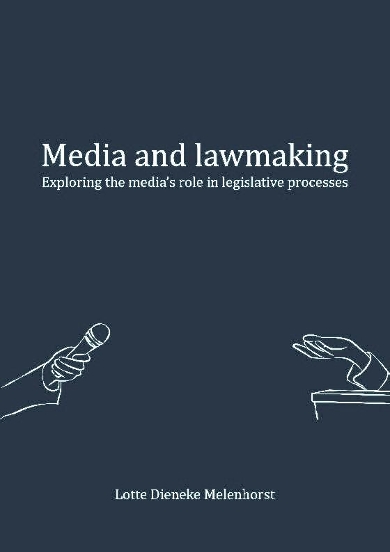
No evidence for mediatisation of lawmaking
The widespread idea that politics is mediatised needs to be revised. Although media attention heavily influences some political processes, this is not the case when it comes to lawmaking. Lotte Melenhorst, a political scientist at Leiden University, analysed three heavily covered legislative processes in the Netherlands for her PhD thesis. ‘Media attention played a role during these processes, but its effect on the legislative outcomes is negligible’, she explains.
All politics is mediatised?
The overwhelming amount of existing research on media and politics conveys an impression that all politics is mediatised. The concept ‘politics’ however delineates many things and not all types of political processes have been studied to the same extent. Therefore Melenhorst decided to explore the media’s role in an important yet understudied type of political process: lawmaking. ‘The decisions made during legislative processes usually have direct implications for the daily lives of many citizens. Therefore I wanted to know whether legislators are influenced by media coverage.’
Reconstructing legislative processes

To study the media’s role in lawmaking Melenhorst conducted three in-depth case studies in the Netherlands. ‘I basically made reconstructions of three legislative processes and all media coverage for them. This allowed me to study very precisely what the media’s role in these processes was.’ Melenhorst did content analyses of media coverage and parliamentary documents and conducted interviews with 96 political, departmental and journalistic actors. The bills received ample media coverage, so the relevant mechanisms via which media affects lawmaking would likely become visible. Her conclusion is, however, that although media coverage played a role during these lawmaking processes, it had limited, if any, influence on the legislative outcomes. This means there is no evidence for the mediatisation of lawmaking.
Room for manoeuver
According to Melenhorst, to understand why media effects are marginal, we should consider the political context in which these legislative processes took place. ‘The bills dealt with the remuneration of senior officials in the (semi)public sector, the restructuring of employment law and the introduction of a new student finance system. All three issues have been subject of both public and political debate for years, if not decades.’ As a consequence, parties’ positions towards the bills are often already decided upon prior to the legislative process. And in addition to that, various parties signed agreements about the topics of the second and the third bill. ‘Because of that, they felt like they did not have much room for manoeuver during the legislative process, and thus also couldn’t really respond to media coverage.’
An emphasising effect
Did media coverage not play any role during these processes, then? ‘It did play a role’, Melenhorst explains. ‘Whereas media coverage did not affect the outcomes of the lawmaking processes, it did play a role during legislative debates.’ As a source of information, media coverage puts emphasis on issues, arguments or actors; and as a rhetorical instrument, MPs use it to emphasise the correctness, topicality, or importance of one’s position. ‘The media’s influence on lawmaking seems to mainly be an emphasising effect.’
Normative perspective
From a more normative perspective, it can be perceived as problematic that even in the cases studied, the attention for the actual content of the bills, let alone for the various positions parties taken during legislative debates, was very limited. The traditional mass media also function only to a very limited extent as a platform for public debate in the context of legislation. However, at least within the Netherlands, MPs seem not to be swayed by the issues of the day when they are discussing and making bills. This is an important conclusion in light of the alleged mediatisation of politics. Journalists are present in and around legislative processes, but their substantial influence is marginal and not necessarily negative from a democratic perspective.
Exploring the policy-side of academia
Melenhorst will defend her PhD thesis at Leiden University on 21 March 2017. From April onwards she will be working as a policy officer at the Delft University of Technology, at the department for ‘Strategic Development’. ‘I really enjoyed my time as a PhD candidate and love doing research. However, during my PhD trajectory I worked as a policy officer at NWO, the Netherlands Organisation for Scientific Research, for five months. There I found out that I am also very interested in the policy-side of academia. So now I will get the chance to further explore that side!’
